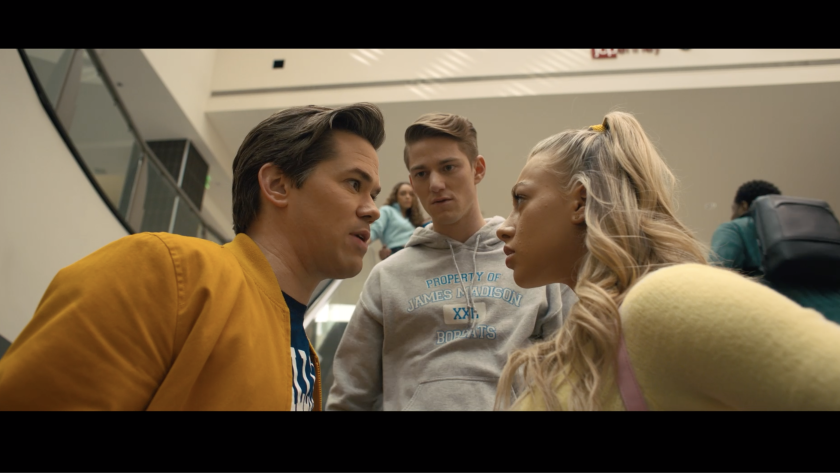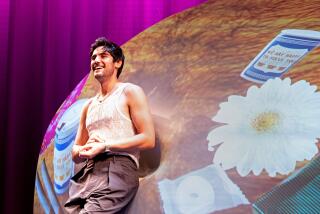- Share via
“Why do you hate gay people?” asks Andrew Rannells in “The Prom,” the Netflix movie about Broadway actors who try to help a lesbian teen attend her school dance.
The students around him assert that, despite their condemnation of their queer classmate, they’re good people. It’s just that they’re Christian, and their religion considers homosexuality a sin. (Premarital sex, masturbation and divorce are also called deplorable, but that’s different, right?)
The scene then kindly highlights the hypocrisy of gay-hating Christians, and genuinely bridges what some real-life Bible thumpers consider an insurmountable ideological divide. How so? By quoting the Good Book itself in the show-stopping number “Love Thy Neighbor.” And a spectacular dance break in the middle of a mall doesn’t hurt.
“I love that this song basically says you can’t cherry-pick what you believe of this religion, which is supposed to be rooted in kindness,” says director Ryan Murphy. “Growing up, I was a gay kid, going to Catholic school in a small town, being told I was going to rot in hell. I remember saying to my parents at a very early age, ‘Doesn’t God love everybody?’”
- Share via
Ryan Murphy’s adaptation of the Broadway musical ‘The Prom’ brings James Corden, Nicole Kidman, Kerry Washington and Keegan-Michael Key to the dance.
The show-stopping moment has been in the works for a decade — long before the material would become a feature film, also starring Meryl Streep, James Corden, Nicole Kidman, Kerry Washington and Keegan-Michael Key.
The creators of the original stage musical needed the story’s liberals and conservatives to realistically inch toward a common ground. The character who attempts to facilitate is Trent, an actor who graduated from Juilliard and “really, really loves to hear himself talk,” says lyricist Chad Beguelin. (Rannells has firsthand experience: “I did date someone who went to Juilliard, and he would definitely drop it into conversation all the time. It is a real thing.”)
Throughout what composer Matthew Sklar calls “a white guy gospel song” in the vein of theologically minded musicals “Godspell,” “Jesus Christ Superstar” and “Children of Eden,” Trent spends the verses pointing to transgressions the teens commit, and forgive, on a daily basis.
He then reminds them that, according to Jesus, “Thou shalt love thy neighbor as thyself” is one of the two greatest commandments. In other words, “‘Love thy neighbor’ trumps them all” — a line repeated throughout the catchy chorus.
The show was in the midst of its pre-Broadway tryout in Atlanta when Donald Trump was elected president in 2016. “A producer asked us if we were gonna change the lyrics,” recalls Sklar. “It’s a song about being understanding and loving to others, and it has his name in it, over and over again. The irony was too good, we were like, ‘Let’s leave it.’”
Onstage, the number had Trent (Christopher Sieber) preaching to loitering teens in a 7-Eleven-ish parking lot. “We couldn’t do that in the movie because 7-Eleven turned us down and wouldn’t let us use their [branding],” says Murphy.
Instead, the moment unfolds in a mall, the watering hole of suburban adolescents; specifically, the Northridge Fashion Center (standing in for the film’s Indiana setting), with an escalator that leads to an eye-catching fountain. (Murphy obsessed over a shot in which the camera pans to a set of suspended jumbotrons which, at one angle, resemble a massive cross.)
Casey Nicholaw, who also directed the stage show, choreographed the entire routine around the fountain, which was reprogrammed, repainted and outfitted with platforms. He even got Rannells to do a jazz split — a throwback to his breakout role in “The Book of Mormon,” their previous collaboration.
“Dancing is certainly not a skill that I have,” admits Rannells. “I was 41 at the time, trying to keep up with these dazzling 20-year-old dancers doing backflips. I had to sit down a few times, because Peepaw needs a break!”
The spectacle showcased upwards of 100 people, not counting locals simply strolling through the mall, which remained open throughout the shoot. It was filmed in February, when government-mandated shutdowns were still weeks away. Since then, “crowd scenes have become the new pornography,” says Murphy.
Though the lyrics of “Love Thy Neighbor” haven’t changed from stage to screen, some introductory dialogue satirizing Fox News was left unshot at the last minute. “We didn’t want to alienate anybody from the message of the movie,” Murphy explains.
The creative team isn’t necessarily nervous about a backlash from conservative viewers, who expressed outrage when the show’s Macy’s Thanksgiving Day Parade performance in 2018 brought the broadcast its first same-sex kiss. Rannells and Nicholaw braced themselves for a similar reaction when “Mormon” debuted, “but there wasn’t as much pushback as we expected, because we were talking about being kind to each other,” says Nicholaw. “And it’s hard to argue with that, especially if the product is good.”
The song and dance “might change some minds or at least put some questions in people’s heads and give them something to think about,” says Rannells. “The golden rule of ‘treat people how you’d like to be treated’ is somehow, miraculously, the one everyone forgets, even though it’s the most basic.
“This song is really just saying, try to be nice people, you know? Don’t be a dick,” he adds with a laugh. “That was the alternate title. Apparently, that’s too controversial though.”
More to Read
Only good movies
Get the Indie Focus newsletter, Mark Olsen's weekly guide to the world of cinema.
You may occasionally receive promotional content from the Los Angeles Times.












